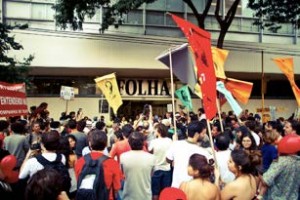André Pagliarini, Brown University
Abstract
In this paper I examine the publications, declarations, and public acts of a number of social groups, collectives, and co-ops, primarily along the political left, who jointly maintain not only that the period from 1964 to 1985 constituted a “civil-military” dictatorship but that the same “civil-military” dictatorship complex remains largely intact today. Specifically, I trace the contentious yet revealing back-and-forth between an alternative São Paulo-based art collective called Coletivo Zagaia and leftist activist and journalist Pedro Estevam da Rocha Pomar that took place in 2012. In a widely circulated online essay entitled “Um modismo equivocado”—“A Wrong-Headed Fad”—Pomar strongly criticized the usage of the “civil-military” concept by Zagaia and likeminded groups in demonstrations that year. In response, Zagaia articulated a common critique of the traditional Left in Brazil (in this case personified by Pomar) that it was domineering, rigid, often intolerant, and undemocratic.
 2014 marked the fiftieth anniversary of the military coup in Brazil, a milestone observed through innumerable analyses and remembrances. The contentious question of continuity versus rupture from the dictatorial period to the present was a consistent topic of discussion. Many groups stressing continuity have called for a revision of historiographical terminology, saying the regime is more accurately described as a “civil-military” dictatorship. Others, pointing to the ultimate arbitrating power of the military, insist on the “military” nomenclature.
2014 marked the fiftieth anniversary of the military coup in Brazil, a milestone observed through innumerable analyses and remembrances. The contentious question of continuity versus rupture from the dictatorial period to the present was a consistent topic of discussion. Many groups stressing continuity have called for a revision of historiographical terminology, saying the regime is more accurately described as a “civil-military” dictatorship. Others, pointing to the ultimate arbitrating power of the military, insist on the “military” nomenclature.
To what extent does the lifeblood of the military regime still course through the veins of the Brazilian body politic?
Those arguing for the “civil” denomination in this case were in fact articulating a forceful critique of modern-day Brazilian politics, namely that too much of the arbitrary repressive power of the state lives on. Those arguing against this new terminology—in this case, Pomar—were concerned with the integrity of the historical record of the regime itself, that is the twenty-one year period beginning in 1964. My contention is that while seeming to address the same quandary—what was the nature of the Brazilian dictatorship?—these two sets of actors were actually talking past each other.
This episode illustrates the interplay between academy and civil society through which historiographical revisions of terms and concepts get digested, appropriated, and often reconfigured by actors outside the scholarly community.
Télécharger le poster d’André Pagliarini (PDF)
